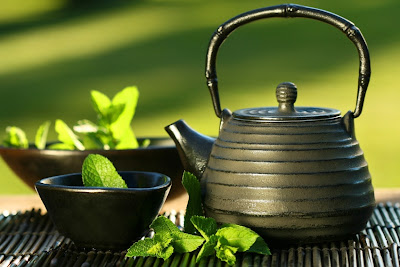Wednesday, May 06, 2009
Drink White Tea, Avoid Hydroxycut
 We all know that rich people eat better, but it's nice how they put it in the Journal of the American Dietetic Association: "People with higher socio-economic status and educational levels are more likely to consume a costly but high-quality diet of lower-energy-density foods." Love that tone. (Thx ModernMedicine.com.)
We all know that rich people eat better, but it's nice how they put it in the Journal of the American Dietetic Association: "People with higher socio-economic status and educational levels are more likely to consume a costly but high-quality diet of lower-energy-density foods." Love that tone. (Thx ModernMedicine.com.)What we didn't know was that certain clever, rich people might be losing weight by drinking "white tea." Black teas, we just learned, are "cured and oxidized," whereas white tea is the unadulterated, virgin leaf, (and often comes complete with young leaves and flowering buds.)
German researchers are now saying that -- just maybe -- white tea slows the growth of new fat cells. Time to hit up your local Whole Foods. Meanwhile, at the other end of the socio-economic spectrum, poor people are using soup cans and dishtowels to stay in shape, and they're guzzling Hydroxycut dietary supplements, many of which are currently being recalled (by the ironically named manufacturer Iovate Health Sciences) because, well, they might destroy your liver or kill you.
Thanks!
Labels: bagged tea, burn fat, diet, Hydroxycut, Iovate Health, study, weight loss, white tea
Sunday, April 12, 2009
Is Canned or Bottled Green Tea as Good as Freshly Steeped?
 All teas need to be freshly steeped to receive the most benefits. Also, the steeping process itself is very important, and different steeping methods have been compared in research studies investigating the health benefits of green tea.
All teas need to be freshly steeped to receive the most benefits. Also, the steeping process itself is very important, and different steeping methods have been compared in research studies investigating the health benefits of green tea. Much of the research on green tea has focused on its polyphenol content. Many different kinds of polyphenols are found in green tea, and these polyphenols will become increasingly present in the tea water the longer a tea is steeped. (This principle holds true for green tea, white tea, black tea, and oolong tea.) Catechins, theaflavins, and thearubigins are among the best studied of the green tea polyphenols that are known to increase in the tea water as steeping times increase.
Given an equal amount of steeping time, loose leaf teas do a better job of passing on their polyphenol content than bagged teas because loose leaf teas expose their whole leaves to the steeping water during the entire steeping time. Bagged teas, by contrast, may float on top of the steeping water and expose less of the tea leaves directly to the water. (You can improve this situation by allowing the tea bag to bob down into the water from time to time during the steeping process.)
When you brew tea yourself, you can control this steeping process in a way that will maximize the polyphenol content of your tea. When you buy a bottled tea, however, you may or may not get a tea that has been carefully brewed. In addition, you are likely to get a tea that includes other ingredients and is not simply 100% brewed tea.
In 2005, the Linus Pauling Institute at Oregon State University issued a report showing that many bottled teas contained polyphenol content 10 to 100 times lower than freshly and carefully brewed teas. Differences between bottled tea and freshly brewed tea were attributed to steeping process, amount of actual tea found in the bottled products, and presence of non-tea ingredients in the bottled teas, including sugar. In addition, bottled tea companies were sometimes found to use powdered rather than brewed tea in their products.
If you do choose to make bottled tea a regular part of your diet, be sure to find a manufacturer who produces a high-quality bottled beverage. You can find unsweetened, organic green teas in bottled form in some natural foods stores and on the Internet; these teas will provide you with health benefits closer to those offered by freshly and carefully steeped tea.
Labels: bagged tea, bottled tea, catechins, drinks, green tea, healthy beverage, loose leaf tea, polyphenols, steeping tea, tea